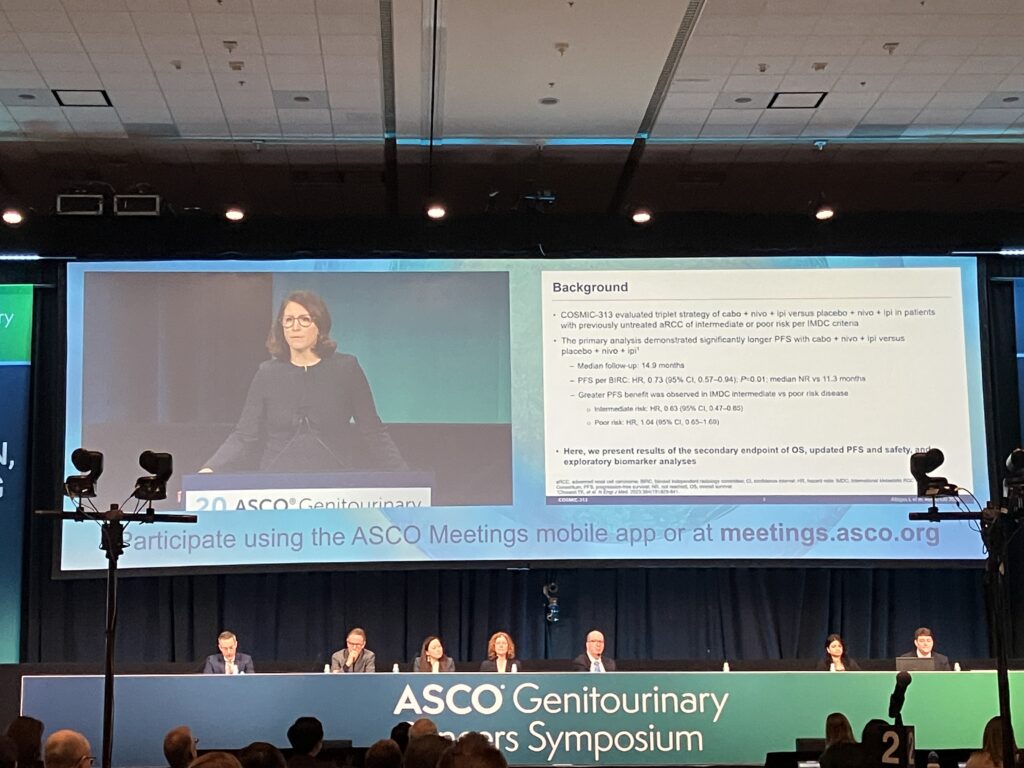
Kidney Cancer Highlights from 2025 ASCO GU
We rounded up a few research highlights from the 2025 ASCO Genitourinary Cancers Symposium (ASCO GU), held recently in San Francisco, California.
Three-drug combo superior to two drugs for advanced RCC
Advanced renal cell carcinoma (RCC) patients (855 people) given a combination of cabozantinib, nivolumab, and ipilimumab had longer progression-free survival compared with patients given nivolumab and ipilimumab plus a placebo – 16.5 vs 11 months – according to updated data after 45 months of follow up of the COSMIC-313 trial. The triplet group also had higher response to treatment. However, overall survival was the same between both groups. Participants reported severe and life-threatening side effects more often in the triplet group (81%) compared with the nivolumab/ipilimumab group (62%).

While nivolumab and ipilumumab are both immunotherapies, cabozantinib is a targeted therapy that prevents tyrosine kinase proteins from helping tumor growth. The study participants had not received other treatments prior to the COSMIC trial.
The researchers, led by Dr. Laurence Albiges at the Gustave Roussy cancer center in France, also observed that high levels of a type of white blood cell called an M2 macrophage was associated with improved overall survival in patients in the triplet arm. The M2 macrophage could be a potential biomarker to identify advanced RCC patients who would benefit from the addition of cabozantinib to a nivolumab/ipilimumab combination regimen and additional analysis continues. [2025 ASCO GU, Abstract 438]
Combination second line treatments promising in ccRCC
Kidney cancer patients need additional treatment options if they progress following an initial therapy, as many do.
The KEYMAKER-U03 Substudy 03B examined three combinations of an immunotherapy and a targeted therapy in clear cell RCC patients who had disease progression after initial treatment with an immunotherapy and a VEGF-TKI targeted therapy.
This phase 1/2 trial compared:
- pembrolizumab + belzutifan
- lenvatinib + belzutifan
- pembrolizumab + lenvatinib (reference group)
Pembrolizumab is an immunotherapy, lenvatinib is a VEGF TKI targeted therapy, and belzutifan is a HIF-2a targeted inhibitor.
After about 1.5 years of follow up, nearly half of patients given lenvatinib + belzutifan responded to the treatment and their tumors shrank, including one patient with a complete response, and 8 in 10 patients survived for at least one year. More than half of patients did report severe or life-threatening side effects in this group.
Pembrolizumab + belzutifan showed the least benefit to the enrolled patients, with a fifth responding to treatment and 7 in 10 surviving at least one year.
The results support additional study of lenvatinib + belzutifan for people with advanced RCC. The results also suggest that, even in heavily pre-treated patient populations, there is still an opportunity to access and participate in clinical trials. [2025 ASCO GU, Abstract 440]
Combination immune/TKI therapy remains superior after 5 years
After over 5 years of follow up, combination therapy with the TKI inhibitor cabozantinib plus the immunotherapy nivolumab is superior at shrinking tumors and improving survival in advanced kidney cancer patients compared with sunitinib.
The phase 3 CheckMate-9ER trial included 651previously untreated people with advanced RCC who received either cabozantinib plus nivolumab or sunitinib alone. Average overall survival was nearly a year longer (46.5 months vs 35.5 months) in the combination arm vs sunitinib arm. Treatment response doubled in 56% of the combination arm vs 28% of the sunitinib arm – a ratio maintained after 5 years – including 13.6% having complete response to treatment in the combination arm vs 4.6% with sunitinib.
Sunitinib is a long-standing kidney cancer therapy first approved in 2006 as a first-line treatment for metastatic RCC. Since it’s approval, many more targeted therapies and immunotherapies have been approved for kidney cancer treatment. The long-term follow up data from trials like CheckMate-9ER demonstrates how ongoing research and the evolution and expansion of kidney cancer therapies continues to benefit patients over time. [2025 ASCO GU, Abstract 439]